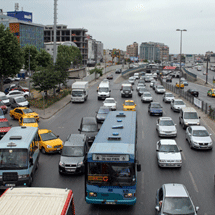In July 2011, ESMAP released a final report on the Developing an Energy Efficient Urban Transport Plan for Zarqa City Downtown Area project. Titled Developing an Energy Efficient Urban Transport Plan for Zarqa City Downtown Area, the report is intended to inform a new Zarqa Master Plan, which is being developed by Jordan’s Ministry of Municipal Affairs. Read more about the report and the project here.

In collaboration with the government of Jordan, the World Bank’s Energy Sector Management Assistance Program (ESMAP) has launched an urban mobility project to make Zarqa city transportation energy efficient and environmentally friendly.
The project will assess and recommend strategies to establish an efficient public bus system to ease mobility of thousands of Zarqa residents who commute daily to Amman city to work and study. Zarqa is Jordan’s second most densely populated and urbanised city and is home to over 50 per cent of Jordan’s factories.
In September, a team of World Bank experts in urban transportation planning and energy efficiency visited Jordan to initiate the development of an energy efficient urban transport plan for Zarqa city. The team met several government and Zarqa municipality officials and they identified opportunities for developing an energy efficient mobility plan as well as mobility constraints facing Jordanians. They also drew an implementation action plan for the project.
“Jordan’s growth stems largely from economic activities within Amman and Zarqa urban conurbation. It is therefore crucial that Jordan develops an energy efficient urban transportation plan to foster economic growth, ease mobility, and conserve energy,” said ESMAP’s Senior Energy Specialist Ranjan Bose. “Jordan also depends on imports to meet its energy needs, the introduction of energy efficient public bus systems will lower overall energy consumption and reduce energy emissions,” Bose said.
The Government of Jordan reached an agreement with the World Bank Group’s International Finance Corporation (IFC) to construct a new Amman-Zarqa Light Railway Project. The light railway is likely to be implemented as a public-private partnership and involves the construction of a 28-kilometer dual rack railway between Amman city and Zarqa city. However, the location of the proposed Light Railway Station is far from public bus stations, making it difficult for commuters to reach cities. To address this challenge, ESMAP’s technical guidance on creating an energy efficient rapid bus system is central to helping Jordanians achieve an effective, efficient and climate-friendly urban transport system for sustained economic growth.
ESMAP plans to implement the following activities over a nine-month period (September 2010 – June 2011) to improve traffic mobility and reduce energy use and vehicular emissions:
-
Develop an energy efficient mobility plan for downtown area in Zarqa;
-
Control and reduce energy consumption and reduce pollutant and greenhouse gases related to the transport of passengers and goods;
-
Develop a plan for efficient and easy access to the proposed Amman-Zarqa light rail terminal using bus public transport; and
-
Develop a realistic, phased programme of investment over the short and long-term time horizon.
Zarqa’s energy efficient urban transport plan is being implemented alongside a Cities Alliance-funded project to support the development of city development strategies in four Jordanian secondary cities (Karak, Mafraq, Zarqa and Tafilah) .
This article was first published on the ESMAP website.




